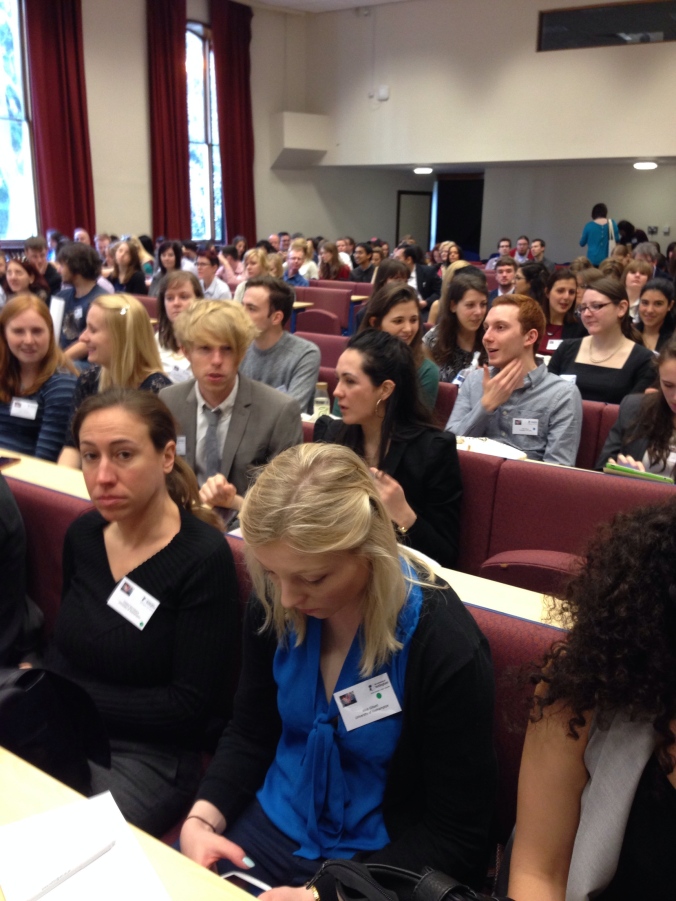Monday 14 April 2014, 10:30 am, University of Nottingham, and Professor Alan Ford, Pro-Vice Chancellor for Teaching and Learning at the University of Nottingham is opening the 4th Annual Meeting of the British Conference for Undergraduate Research. Having opened proceedings, one illustrious speaker hands the baton to the next one, and Professor Stephen Mumford, Philosopher and Dean of the Faculty of Arts at Nottingham, takes the floor to address the 300+ audience on ‘Knowledge is Power’.
Mumford opened his talk by looking at what is the role of knowledge and does knowledge empower us and empower humanity,and if so, how is this knowledge generated? The speaker here clearly acknowledged his multi-disciplinary audience and spoke of the many ways in which different disciplines treat and classify knowledge, be it empirical, experimental, theoretical, abstract, or even intuitive.
Recognizing knowledge leads to thinking about knowledge as a means of empowerment and Mumford here asked the audience to reflect on whether we do, in fact know, what knowledge is? After all, he suggested, the key point for ⌗BCUR14 is to establish what we need to do with knowledge that we have acquired, and at a conference, knowledge is disseminated, and furher knowledge is in turn generated.
In a moment of autobiographical reflection, the speaker talked of growing up in a house devoid of books; Mumford classified this context as a disempowered context. In order to break free from this environment, power came from knowledge, and the way to knowledge was through education. While his examples may be drawn from his background as philosopher, with an emphasis on philosophy as a repository and generator for theoretical knowledge, a distinction has nevertheless to be made between knowing the what and the knowing of how. Knowing how is what is empowering, as this allows you to do things. Philosophy trains a student to know what, and this is the first step towards identifying the need for knowledge. Knowledge generation has different stages, and this is where Mumford returned to the context of the plenary as opening
a conference as a convention that brings together people, all ready to discuss new knowledge, new research, and to focus on new questions.
Mumford here offered the audience a list of top tips for being- and becoming- a successful researcher:
first and foremost, he spoke emphatically of the need toto be passionate about your subject;
but while passion is what drives you, you also need to be lucky. Many people work in your field, so be able to find your topic, explore it, but expect to be flexible and diversify.
Mumford then turned to the theme of collaboration, which is in many ways a different process of generating knowledge, because collaboration as a model arguably generates better knowledge by working differently. Collaboration does not save time with research; its time consuming but rewarding because the knowledge that is generated is based on sharing, on arguing, on debating, and ultimately, collaboration leads to interdisciplinary and this process will inexorable lead you to ask different questions. Here, the talk was drawing on examples based on Mumford’s own research, both as a sole author but also his more recent work co-authoring a number of projects with Dr Rani Lil Anjum. By bringing knowledge back to his philosophical roots, Mumford neatly grounded his talk in his own discipline and found a neat way of emphasising both the significance of disciplinary roots but also the way in which knowledge transcends the traditional departmental structures of higher education.
Summing up, Mumford spoke of the process of a conference: sharing knowledge is an enabling process, when the process of becoming a researcher turns you from somebody acquiring knowledge to somebody empowering others by sharing knowledge. Here, he directly addressed the young reseachers attending ⌗BCUR14 and spoke of the delegates as embarking on their journey of knowledge, perfecting research skills,learning techniques and skills. BCUR offers them an opportunity to present research at an early stage. And then he advised delegates to never be discouraged that each new discovery shows more clearly how much more there is to be discovered. Learning is often about discovering new areas of ignorance- there will always be more things to be discovered- and surely, this is not a reason to be disheartened but an incentive to strive for more knowledge if ever there was one. Mumford urged delegates to love their subject and the watch benefits of research unfold as their knowledge helps to inspire a new generation of researchers. fFor Mumford, few things are more important than the production of knowledge; knowledge is power; research empowers humanity, research and knowledge are about dreams and opportunities- go out, learn, smash some old paradigms, and then disseminate and share what you have found. The plenary certainly hit the right notes in putting a bounce into delegates’ steps as they dispersed to take to the floor themselves….
Gabriele Neher (gabrieleneher)
